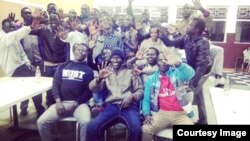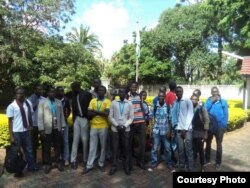Twenty-nine South Sudanese students on a government-sponsored scholarship to study at Zimbabwe's Harare Institute of Technology were forced to leave school a week ago after Juba officials failed to raise hundreds of thousands of dollars for their tuition and fees over three semesters..
A letter from the Harare institute, seen by VOA South Sudan in Focus and addressed to South Sudan's Cultural and Educational Attache, said the school was owed $241,894.
South Sudanese officials did not meet the March 31 payment deadline, and the students said they had no option but to leave campus and live in the embassy while they appealed to the government to pay the bill.
Students have since complained of living in cramped spaces with little food, in an embassy that has no kitchen and one shower with a broken spout and light fixture.
Giir Salfa Deng, 25, a biotechnology student in his second year at the institute, said the education he's been receiving is much needed in his country.
"We are doing all the sciences, so it could have been an advantage for the country," he said. "The only service that I could offer to my people is through my degree. If I could get a degree today, then this is the same degree that would be able to uplift the upcoming generation."
Sleeping on the compound
Gaaniko Bangoye Michael, 23, who is studying electronic commerce at HIT, said the embassy was so small that "students are just sleeping around the compound, under the trees, because we are not given rooms."
There are 147 South Sudanese students spread across other universities in Zimbabwe under the same South Sudan-sponsored scholarship program, according to the students in Harare. They said the government had not paid their fees either, and they expected the others to reach the embassy in the coming days.
But Agheer Marial, 25, studying electronic engineering, said the embassy is struggling to host the students already there.
"Me, personally, I have been sleeping in a chair in the reception room. So I think I spent about five days in that chair sleeping, somehow," said Marial.
He said that for him, the interruption was more than just a financial shock; the situation has taken an emotional toll. Marial said it was "heartbreaking" to come so far in the four-year program and not know what will happen.
"We have actually spent, like, two years already in the university, so we are almost to the last part of our courses," he said. "But unfortunately, it has happened that we have been kicked out of the university."
Up in the air
Rebecca Achok, a biotechnology student and one of five women in the group, said she was hoping to take her degree back home, but so far the government has not been responsive to their calls.
Students are "not yet sure if they will take us back or if they will pay our school fees," said Achok, who added that it had been difficult not knowing what would happen to them.
The students said the South Sudanese ambassador to Zimbabwe and the cultural attache were urging their government to pay the fees promptly.
Bangoye said they were in a situation that "we can't control by ourselves," and they urged Juba to look into their issue "as fast as possible" so that they can take exams in a couple of weeks.
Email and phone call requests for comment to the Harare Institute of Technology have gone unanswered. The government of South Sudan did not return a request for comment.






